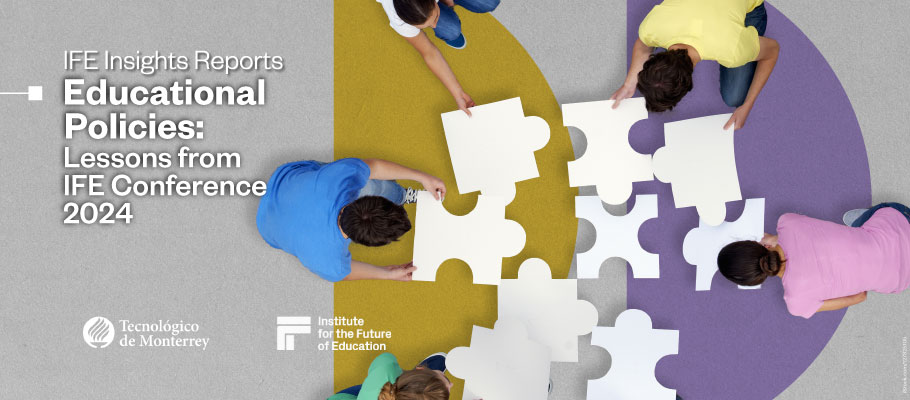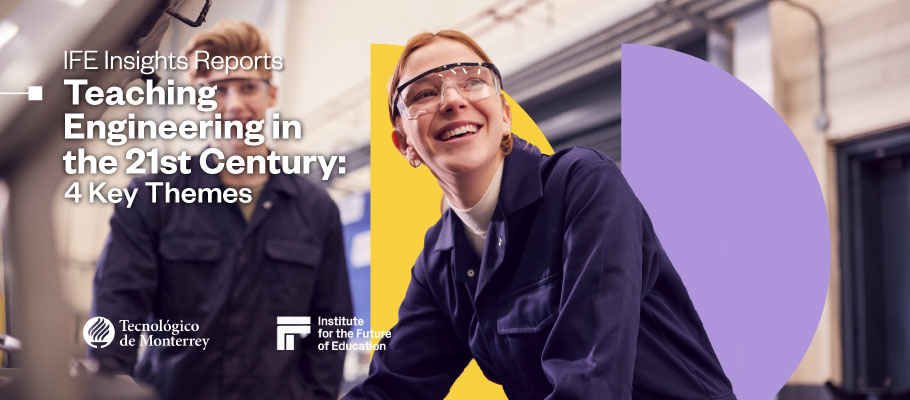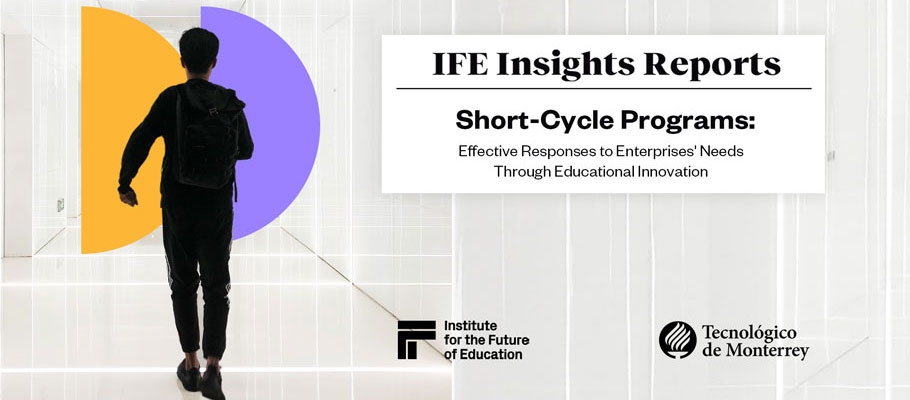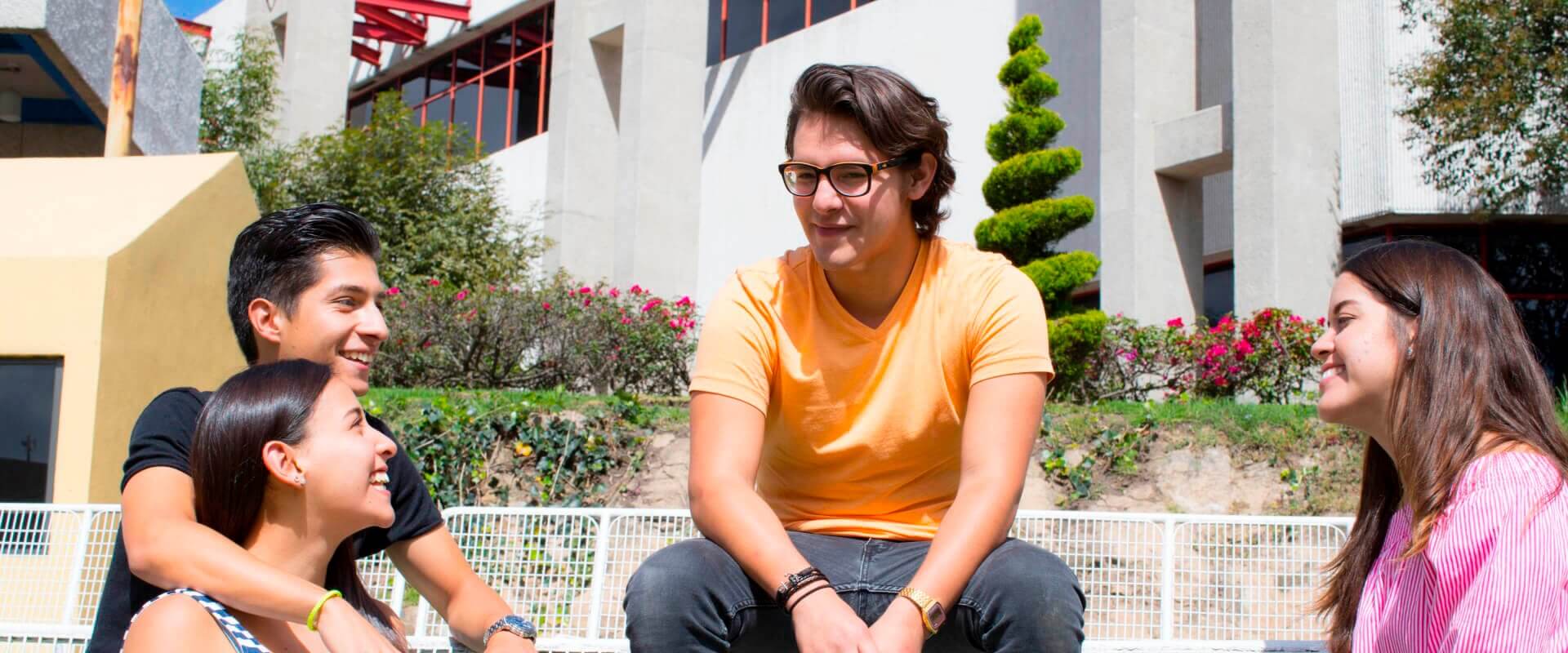EXATEC Blue Open Golf Tour 2025 Cd. Obregón
Club de Golf Ciudad Obregón
Inicia
Dirigido a
Organiza


The IFE Impact Reports present a summary of the achievements of all initiatives undertaken by the Institute for the Future of Education over a one-year period. Through a diverse portfolio of initiatives, the Institute engages in partnerships with academia, industry experts, policymakers, and visionary leaders to shape the future of the educational landscape.
This report is structured into four key sections:




The IFE Impact Report is more than just a document; it is an invitation to join the effort to improve education worldwide. Readers will find inspiration in the achievements reached, as well as in the stories of collaboration that have been essential in driving these advances. As they explore the report, they will discover concrete examples of how educational innovation and research can transform lives and open new learning opportunities.
The IFE Impact Reports present a summary of the achievements of all initiatives undertaken by the Institute for the Future of Education over a one-year period. Through a diverse portfolio of initiatives, the Institute engages in partnerships with academia, industry experts, policymakers, and visionary leaders to shape the future of the educational landscape.
This report is structured into four key sections:




The IFE Impact Report is more than just a document; it is an invitation to join the effort to improve education worldwide. Readers will find inspiration in the achievements reached, as well as in the stories of collaboration that have been essential in driving these advances. As they explore the report, they will discover concrete examples of how educational innovation and research can transform lives and open new learning opportunities.
Welcome to the IFE Insights Report: Your guide to the future of education
The IFE Insights Report provides readers with deep understanding as well as expert insight into relevant topics in educational innovation. This report seeks to be a valuable source of information and an essential reference for the educational sector, in such a way that it contributes effectively to the advancement of education.
We invite you to download and join our dream of improving the lives of millions of people through the transformation of education.

Constant innovation is necessary in technologies, teaching strategies, and facilities, to name a few. In addition, one of the priority areas of innovation should be educational policy since this area regulates and manages the other areas. Innovation in policies means that schools need to adapt themselves to new generations and the novelties that come with them, as well as what will be expected of them to thrive in the future.
Tecnológico de Monterrey’s IFE Conference 2024 didn’t stay behind and made sure to include a series of conversations dedicated to educational policy. Throughout three days, the Policy Track at IFE brought together many talented people from different universities across the world who work within this field and shared with the audience their experiences and thoughts on related topics such as flexible and responsive education systems, digital and green economy, ethical concerns regarding AI, and modern strategies to implement educational policies. In addition, government representatives were able to shed light on Mexico’s situation regarding current policies.
PDF | Download File get_app

This report focuses on how expectations from parents, communities, and policymakers have changed, demanding greater transparency and accountability in school performance. In response to these requirements, Learning Analytics (LA) emerges as an essential and powerful tool. LA can be used to collect and analyze detailed data on student performance at both the individual and group levels. It goes beyond simply measuring results on standardized tests; it offers a continuous, contextualized assessment of students’ academic and social-emotional progress throughout their academic development. By using advanced data analysis algorithms and techniques, LA tools can identify patterns, trends, and areas for improvement that might otherwise go unnoticed in more traditional assessments.
PDF | Download File get_app

The WEEF & GEDC 2023 conference, a world-renowned event for engineering schools around the globe, brought together deans from different countries to discuss topics related to the improvement of engineering education and its current challenges, such as the adversities of including Artificial Intelligence in the curricula, the benefits and disadvantages of different levels of transdisciplinary engineering education, the role of women in STEM (Science, Technology, Engineering, and Mathematics) areas and the importance of forming links between industry and engineering schools.
Encounters like this one are the first steps in shaping professionals who will face an unknown future. This space helps to set a precedent in different summits and meetings for leaders around the world, establishing a framework of reference.
Likewise, the forum focused on discussing engineering solutions for some of the UN Sustainable Development Goals (SDGs), establishing that engineering education should aim to graduate students capable of “thinking creatively, improving their skills in emerging technologies, processes and systems, while meeting the daily demands of their jobs.”
PDF | Download File get_app

The importance of digital education lies in its power to empower present and future generations to thrive in a world shaped by technology. By embracing this educational revolution, we open the doors to innovation, creativity, and human progress. However, only through collective commitment and an inclusive vision can we fully harness the transformative potential of Digital Education.
This report explores the multiple facets, challenges and possibilities this educational model presents. It is a journey toward understanding how the fusion between education and technology can shape a brighter, more equitable future for all.
PDF | Download File get_app

In a world with rapid changes, where innovation and information are fundamental, at the Institute for the Future of Education we provide specialized knowledge through the IFE Insights Report, a publication where experts analyze relevant topics in educational innovation.
Our goal with IFE Insights Report is to provide readers with in-depth understanding as well as expert insight, which is a valuable source of information and an essential reference for the education sector, effectively contributing to the advancement of education.
Read our first report entitled “Short Cycle Programs: Effective Responses to Enterprises' Needs Through Educational Innovation”
PDF | Download File get_app
Welcome to the IFE Insights Report: Your guide to the future of education
The IFE Insights Report provides readers with deep understanding as well as expert insight into relevant topics in educational innovation. This report seeks to be a valuable source of information and an essential reference for the educational sector, in such a way that it contributes effectively to the advancement of education.
We invite you to download and join our dream of improving the lives of millions of people through the transformation of education.

Constant innovation is necessary in technologies, teaching strategies, and facilities, to name a few. In addition, one of the priority areas of innovation should be educational policy since this area regulates and manages the other areas. Innovation in policies means that schools need to adapt themselves to new generations and the novelties that come with them, as well as what will be expected of them to thrive in the future.
Tecnológico de Monterrey’s IFE Conference 2024 didn’t stay behind and made sure to include a series of conversations dedicated to educational policy. Throughout three days, the Policy Track at IFE brought together many talented people from different universities across the world who work within this field and shared with the audience their experiences and thoughts on related topics such as flexible and responsive education systems, digital and green economy, ethical concerns regarding AI, and modern strategies to implement educational policies. In addition, government representatives were able to shed light on Mexico’s situation regarding current policies.
PDF | Download File get_app

This report focuses on how expectations from parents, communities, and policymakers have changed, demanding greater transparency and accountability in school performance. In response to these requirements, Learning Analytics (LA) emerges as an essential and powerful tool. LA can be used to collect and analyze detailed data on student performance at both the individual and group levels. It goes beyond simply measuring results on standardized tests; it offers a continuous, contextualized assessment of students’ academic and social-emotional progress throughout their academic development. By using advanced data analysis algorithms and techniques, LA tools can identify patterns, trends, and areas for improvement that might otherwise go unnoticed in more traditional assessments.
PDF | Download File get_app

The WEEF & GEDC 2023 conference, a world-renowned event for engineering schools around the globe, brought together deans from different countries to discuss topics related to the improvement of engineering education and its current challenges, such as the adversities of including Artificial Intelligence in the curricula, the benefits and disadvantages of different levels of transdisciplinary engineering education, the role of women in STEM (Science, Technology, Engineering, and Mathematics) areas and the importance of forming links between industry and engineering schools.
Encounters like this one are the first steps in shaping professionals who will face an unknown future. This space helps to set a precedent in different summits and meetings for leaders around the world, establishing a framework of reference.
Likewise, the forum focused on discussing engineering solutions for some of the UN Sustainable Development Goals (SDGs), establishing that engineering education should aim to graduate students capable of “thinking creatively, improving their skills in emerging technologies, processes and systems, while meeting the daily demands of their jobs.”
PDF | Download File get_app

The importance of digital education lies in its power to empower present and future generations to thrive in a world shaped by technology. By embracing this educational revolution, we open the doors to innovation, creativity, and human progress. However, only through collective commitment and an inclusive vision can we fully harness the transformative potential of Digital Education.
This report explores the multiple facets, challenges and possibilities this educational model presents. It is a journey toward understanding how the fusion between education and technology can shape a brighter, more equitable future for all.
PDF | Download File get_app

In a world with rapid changes, where innovation and information are fundamental, at the Institute for the Future of Education we provide specialized knowledge through the IFE Insights Report, a publication where experts analyze relevant topics in educational innovation.
Our goal with IFE Insights Report is to provide readers with in-depth understanding as well as expert insight, which is a valuable source of information and an essential reference for the education sector, effectively contributing to the advancement of education.
Read our first report entitled “Short Cycle Programs: Effective Responses to Enterprises' Needs Through Educational Innovation”
PDF | Download File get_app
Nomenclature for International Agencies:
ACEJMC - Accrediting Council on Education in Journalism and Mass Communications
ABET - Accreditor of college and university programs in applied and natural science, computing, engineering, and engineering technology
AACSB - Association to Advance Collegiate Schools of Business
CLAEP - Consejo Latinoamericano de Acreditación de la Educación en Periodismo
IFT - Institute of Food Techonologists
NASAD - National Association of Schools of Art and Design
Nomenclature for National Agencies:
ACCECISO - Asociación para la Acreditación y Certificación de Ciencias Sociales
ANPADEH - Acreditadora Nacional de Programas de Arquitectura y Disciplinas del Espacio Habitable
CACECA - Consejo de Acreditación en la Enseñanza de la Contaduría y Administración
CACEI - Consejo de Acreditación de la Enseñanza de la Ingeniería
CIEES - Comités Interinstitucionales para la Evaluación de la Educación Superior
CNEIP - Consejo de Acreditación para la Enseñanza e Investigación en Psicología
COMAEM - Consejo Mexicano para la Acreditación de la Educación Médica
COMAPROD - Consejo Mexicano para la Acreditación de Programas de Diseño
COMEAA - Comité Mexicano de Acreditación de la Educación Agronómica
CONACE - Consejo Nacional para la Acreditación de la Ciencia Económica
CONAED - Consejo para la Acreditación de la Enseñanza del Derecho
CONAIC - Consejo Nacional de Acreditación en Informática y Computación
CONFEDE - Consejo Nacional para la Acreditación de la Educación Superior en Derecho

Expertise
Economic development
Democracy
State capacity
Dr. Sebastián Mazzuca has worked as a professor at Harvard University, Johns Hopkins University, and the Universidad Nacional de San Martín in Argentina.
His teaching and research work focuses on the political and economic development of Latin America, particularly on four main issues that affect the quality of life of citizens in the region: flawed democracies, stagnant economic growth, high rates of social inequality, and fragile states, as evidenced by high levels of violence, among other factors.
His work has been published by the American Political Science Review, American Journal of Political Science, Comparative Politics, Hispanic American Historical Review, The Oxford Handbook of Political Science, Política y Gobierno (Mexico), and Revista de Ciencia Política (Chile), among many others. His book Latecomer State Formation (Yale University Press, 2021) was featured in The Economist and several newspapers across Latin America.
Sebastían Mazzuca co-authored the article “Political Conflict and Power Sharing in the Origins of Modern Colombia” with Nobel Prize-winning economist James A. Robinson.
Mazzuca has earned multiple awards, such as the Best Article Award from the American Political Science Association in 2015 and the Teaching Excellence Award from Harvard University in 2010 and 2012. He has been a Fellow of the Harvard Academy for International and Area Studies since 2007.
Sebastián Mazzuca joined Tecnológico de Monterrey as a Distinguished Professor in Political Economy for the School of Social Sciences and Government and for the School of Government and Public Transformation.

Expertise
Desarrollo económico
Democracia
Capacidad del Estado
Dr. Sebastián Mazzuca has worked as a professor at Harvard University, Johns Hopkins University, and the Universidad Nacional de San Martín in Argentina.
His teaching and research work focuses on the political and economic development of Latin America, particularly on four main issues that affect the quality of life of citizens in the region: flawed democracies, stagnant economic growth, high rates of social inequality, and fragile states, as evidenced by high levels of violence, among other factors.
His work has been published by the American Political Science Review, American Journal of Political Science, Comparative Politics, Hispanic American Historical Review, The Oxford Handbook of Political Science, Política y Gobierno (Mexico), and Revista de Ciencia Política (Chile), among many others. His book Latecomer State Formation (Yale University Press, 2021) was featured in The Economist and several newspapers across Latin America.
Sebastían Mazzuca co-authored the article “Political Conflict and Power Sharing in the Origins of Modern Colombia” with Nobel Prize-winning economist James A. Robinson.
Mazzuca has earned multiple awards, such as the Best Article Award from the American Political Science Association in 2015 and the Teaching Excellence Award from Harvard University in 2010 and 2012. He has been a Fellow of the Harvard Academy for International and Area Studies since 2007.
Sebastián Mazzuca joined Tecnológico de Monterrey as a Distinguished Professor in Political Economy for the School of Social Sciences and Government and for the School of Government and Public Transformation.
Creada en 2021

